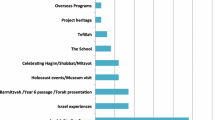Abstract
The researchers conducted a grounded theory study to explore the experiences of Muslim American adolescents in high school. Findings indicate that students had to navigate unique challenges because of their religious faith, but those obstacles presented opportunities to confront bias and discrimination. Recommendations for how school counselors can support the development of Muslim American adolescents are presented.
Similar content being viewed by others

References
Ahmed, S. (2012). Adolescents and emerging adults. In S. Ahmed & M. M. Amer (Eds.), Counseling Muslims: Handbook of mental health issues and interventions (pp. 251–280). New York: Routledge.
Ahmed, S., & Ezzeddine, M. (2009). Challenges and opportunities facing Muslim American youth. Journal of Muslim Mental Health, 4, 159–174. doi:10.1080/15564900903245782.
Ahmed, S., & Reddy, L. A. (2007). Understanding the mental health needs of American Muslims: recommendations and considerations for practice. Journal of Multicultural Counseling and Development, 35, 207–216. doi:10.1002/j.2161-1912.tb00061.x.
Ali, S. A., Liu, W. M., & Humedian, M. (2004). Islam 101: understanding the religion and therapy implications. Professional Psychology: Research and Practice, 35, 635–642.
Ali, O. M., Milstein, G., & Marzuk, P. M. (2005). The Imam’s role in meeting the counseling needs of Muslim communities in the United States. Psychiatric Services, 56, 202–205. doi:10.1176/appi.ps.56.2.202.
Arab American Institute. (2014). American attitudes towards Arabs and Muslims. Washington, DC: Arab American Institute.
Baggerly, J., & Abugideiri, S. E. (2010). Grief counseling for Muslim preschool and elementary school children. Journal of Multicultural Counseling and Development, 38, 112–124. doi:10.1002/j.2161-1912.2010.tb00119.x.
Bogdan, R. C., & Biklen, S. K. (2006). Qualitative research for education: An introduction to theory and methods (5th ed.). Boston: Allyn & Bacon.
Carter, R. B., & El Hindi, A. E. (1999). Counseling Muslim children in school settings. Professional School Counseling, 2, 183–188.
Charmaz, K. (2014). Constructing grounded theory (2nd ed.). Thousand Oaks: Sage.
Council on American-Islamic Relations. (2012). Islam Basics. Retrieved from http://www.cair.com/publications/about-islam.html
Council on American-Islamic Relations. (2013). Legislating Fear: Islamophobia and its impact in the United States 2011–2012. Retrived from http://www.cair.com/islamophobia/legislating-fear-2013-report.html
Erickson, C. D., & Al-Timimi, N. R. (2001). Providing mental health services to Arab Americans: recommendations and considerations. Cultural Diversity and Ethnic Minority Psychology, 7, 308–327. doi:10.1037/1099.9809.7.4.308.
Gallup, Inc. (2009). Religious perceptions in America: with an in-depth analysis of U.S. Attitudes toward Muslims and Islam. Washington, DC: Gallup.
Haddad, Y. Y., & Harb, N. N. (2014). Post-9/11: making Islam an American religion. Religions, 5, 477–501. doi:10.3390/rel5020477.
Haque, A., & Kamil, N. (2012). Islam, Muslims, and mental health. In S. Ahmed & M. M. Amer (Eds.), Counseling Muslims: Handbook of mental health issues and interventions (pp. 3–14). New York: Routledge.
Inayat, Q. (2007). Islamophobia and the therapeutic dialogue. Some reflections. Counselling Psychology Quarterly, 20, 287–293. doi:10.1080/09515070701567804.
Institute for Social Policy and Understanding. (2004). The USA patriot Act: impact on the Arab and Muslim American community. Clinton Township: Institute for Social Policy and Understanding.
Jalalzai, F. (2011). Anxious and active: Muslim perception of discrimination and treatment and its political consequences in the post-September 11, 2001 United States. Politics and Religion, 4, 71–107. doi:10.1017/51755048310000519.
Kobeisy, A. N. (2004). Counseling American Muslims: Understanding the faith and helping the people. Westport: Praeger.
Muslim American Civil Liberties Coalition, Creating Law Enforcement and Accountability & Responsibility, & The Asian American Legal Defense and Education Fund. (2013). Mapping Muslims: NYPD spying and its impact on American Muslims. New York, NY; CLEAR Project, AALDEF, MACLC.
Patton, M. Q. (2002). Qualitative research and evaluation methods. Thousand Oaks: Sage.
Razack, S. H. (2008). Casting Out: The eviction of Muslims from western law & politics. Toronto: University of Toronto Press.
Runnymede Trust Organization. (1997). Islamophobia: A challenge for all of us. London: The Ruunymede Trust.
Said, E. W. (1978). Orientalism. New York: Vintage.
Sink, C. A., & Devlin, J. M. (2011). Student spirituality and school counseling: issues, opportunities, and challenges. Counseling and Values, 55, 130–148. doi:10.1002/j.2161-007X.2011.tb00027.x.
Sirin, S. R., & Fine, M. (2007). Hyphenated selves: Muslim American youth negotiating identities on the fault lines of global conflict. Applied Development Science, 11, 151–163. doi:10.1080/10888690701454658.
Zine, J. (2001). Muslim youth in Canadian schools: education and the politics of religious identity. Anthropology & Education Quarterly, 32, 399–423. doi:10.1525/aeq.2001.32.4.399.
Zine, J. (2006). Unveiled sentiments: gendered Islamophobia and the experiences of veiling among Muslim girls in a Canadian Islamic school. Equity & Excellence in Education, 39, 239–252. doi:10.1080/10665680600788503.
Author information
Authors and Affiliations
Corresponding author
Rights and permissions
About this article
Cite this article
Seward, D.X., Khan, S. Towards An Understanding of Muslim American Adolescent High School Experiences. Int J Adv Counselling 38, 1–11 (2016). https://doi.org/10.1007/s10447-015-9252-5
Published:
Issue Date:
DOI: https://doi.org/10.1007/s10447-015-9252-5



